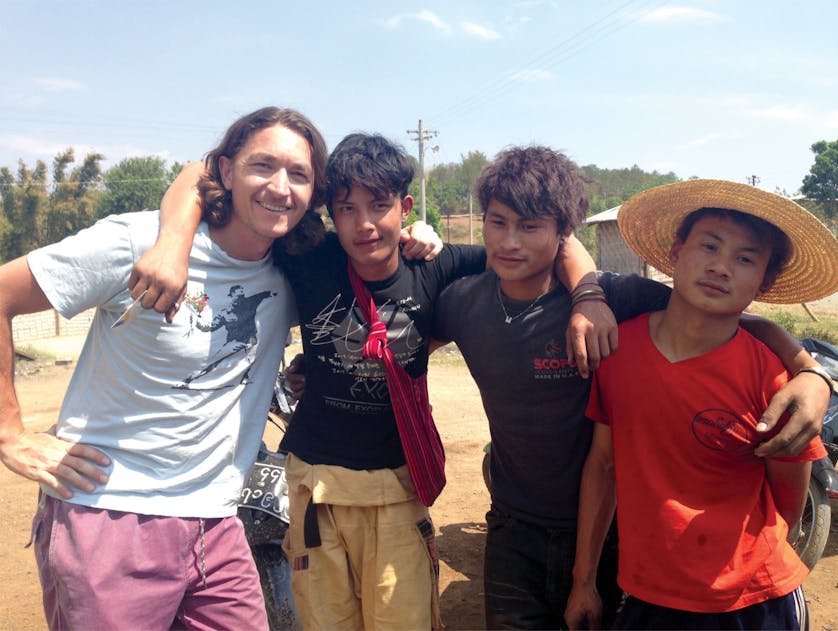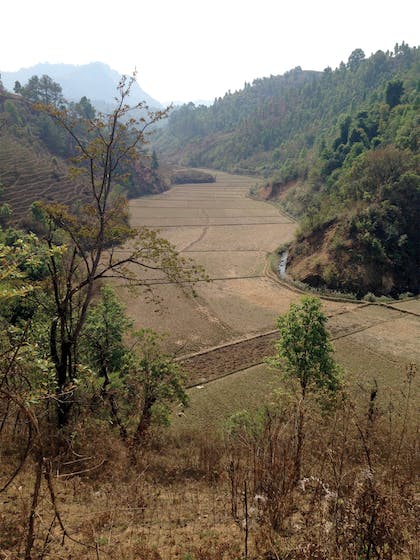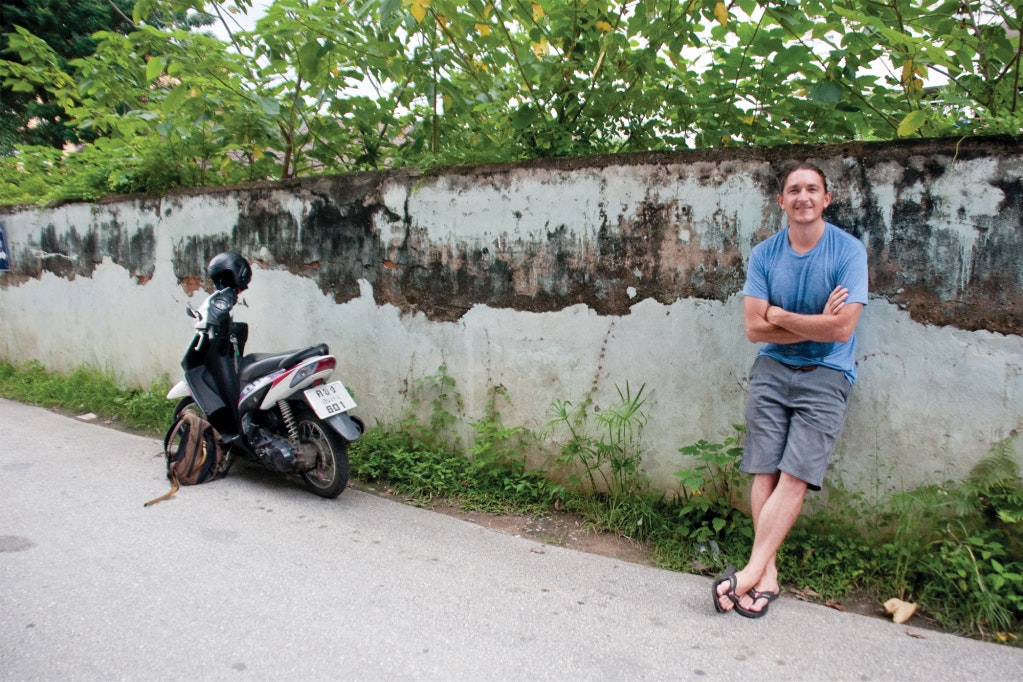When ex-urban designer cum podcast host and author Ash Hoden set off on a solo motorcycle trip around Myanmar, it was nothing more than that. He had no reason to be there, no real destination in mind, and almost no knowledge of the country whatsoever. While a motorbiking trip around Southeast Asia is bound to be a significant experience for anyone that comes from halfway across the globe for the excursion, Ash didn’t truly realise what it meant to him until he started to mentally retrace the events that ensued while working on his second book, Myanmar ‘n Me: Deviant Without a Cause in a (Former) Police State.
Ash arrived in Myanmar after a period of intense self-study in Germany. Following his degree in landscape architecture, and several years at an urban design firm in San Diego, California, Ash found himself in a position where he began to feel dissatisfied with the structure of his career, and was simultaneously disturbed by the social structure of the United States.
“I just saw that, from the people that I talked to, the things they wanted politically and socially weren’t being represented. So I wanted to figure out how everything worked. I guess I just couldn’t form my own opinions about things unless I really took a step back and studied how the system operated. When I really dug into Marx, that’s when it all began to make sense for me – economics and politics and how capitalist production requires society to be trained to function by capitalist rules, trained to work like a soldier in a factory for eight to twelve hours and to operate on clock time, etc. The social, economic, and political are all intertwined. We forget how much cultural and social programming and training is involved.”
Ash left his position, sold his house and his belongings and moved abroad, eventually spending a year and half in Germany studying critical theory: a school of thought that focuses on the assessment and critique of society and culture. “I spent between six and sixteen hours a day, seven days a week reading and taking notes and establishing my ideas for applying an evolutionary twist to contemporary critical theory,” Ash reminisced. When the tires finally met the earthen country roads of Myanmar, he was deep in a mode of the examination of things below the surface; the driving forces behind a society, and why people do the things they do.

“I saw the country through this lens of critical theory as I wandered on motorbike. I saw devastated forests and silted rivers and interpreted it as a resource frontier for global capital. I was held in a military outpost by exceptionally friendly and curious lower-ranking soldiers. But in the background I could see that the higher ranking military officers who were making the decisions about how to handle me – this long-haired foreigner who was trying to drive into an area of active conflict – needed to come up with an excuse for turning me away without making it look like there was something to hide. Myanmar was supposed to be moving towards democracy but there were roads and entire communities that were off limits to foreigners. How does that work? I was a PR crisis for the military. My entire trip was informed by this year and a half of economic and cultural research I had done in Germany.”
Ash spent three weeks in Myanmar on motorbike wandering the country side and emerging into areas that were officially restricted to foreigners. Though the trip was exactly what he intended to do, it was no joy ride. He spent eight to ten hours a day navigating rugged back country roads, developed a sinus infection, suffered infected cuts on his body, and battled two bouts of severe food poisoning. When he finally made it back out of the country to Thailand, exhausted and beaten up, he settled down in Chiang Mai to nurse his wounds and regain his health.
With his mind and body rested, Ash began to work on his memoir of the trip, and the concept for his podcast and website began to emerge.
“Sitting down to write about that experience forced me to more fully scrutinise what it had been about. I realised there was an ethos to the manner in which I went astray of the permitted tourist activities in Myanmar and it was the ethos that made it possible to cross certain lines without being disrespectful.”

Though Ash’s podcast spells out his philosophy of deviation in almost painstaking detail, the concept is actually quite simple. Through travelling and writing, Ash discovered an innate tendency in himself to want to break up the mundane, in whatever seemingly insignificant or massively life altering way possible, and the Deviation podcast (in full, “Deviation: Positively Going Astray”), is a celebration of those moments when he managed to deviate and break up the mundane in his own life, and stories of how others have managed to do the same.
While Ash would agree that “breaking up the mundane” is a very vague explanation of the philosophy that he is building a community around, it’s at least a starting point to understand what Deviation is about. To take it a little deeper, however, Ash has developed five requirements that he believes ensure that deviation is a pursuit of something positive, and does not cause any destruction or harm to anyone else. I’ll leave this deeper level to the podcast however, and Ash’s eloquent explanation.
“The noble pursuit often demands going astray. Deviation is mandatory,” Ash says while opening up the fifth episode of the Deviation podcast which was posted this September. In the latest episode, Ash welcomes Hugh Bayati, a high-performance coach and speaker. Hugh works with people to identify emotional and mental triggers that may create obstacles in their own life, and teaches how to use them for something positive. In the episode, Hugh walks Ash through how he can transform his tendency to anger into something else, and in doing so represents perhaps Ash’s favourite form of deviation, repurposing.
The act of repurposing is something that Ash comes back to time and time again as examples of positive forms of deviation in peoples’ lives. This act of deviation links back to the foundation of the podcast and his studies on critical theory. By repurposing commonplace activities, places or objects that people experience day in and day out, they can experience a positive change and deviation from the norm, and an expression of freedom that most people miss out on. Base jumping is one such act of repurposing that Ash devotes an entire episode of the Deviation podcast to. By repurposing a giant structure that is traditionally used to occupy businesses, the people that work for those businesses, and with a purpose that could be argued to at least partially intimidate and represent power, base jumping repurposes this corporate structure and transforms it into a jumping off point for an extreme sport. This act of deviation, or act of positively going astray, are the stories that Ash has now devoted himself to collecting and extrapolating on how they are positive acts of rebellion, no matter how small or extreme.
Ash has found Chiang Mai to be a perfect place to develop his podcast and website, and has found an extremely supportive and inspiring community, which surprised him due to his time in Germany as a sort of intellectual hermit.
“Chiang Mai has been an exceptional place to work because there’s a great mixture between the talented and really creative Thai community and the foreign expats living and working here. In cafés or around town I’ve come across Thai graduate students or research assistants who have offered cool ideas for me to consider or made suggestions or different approaches to take. One woman I met had written a thesis relating the ideas from some of the theorists I was reading in Germany to the Matrix Trilogy. She had read the same ideas and applied them in an entirely different way than I had. Meeting people like that here in Chiang Mai has been inspiring for me and my work. And some of the expats I’ve come across have also helped by offering ideas for how to move Deviation forward or to develop the ideas more.”
Through the deviation podcast Ash has created a unique community and collection of stories centred around those acts that make us human; positive acts of defiance that prove that freedom cannot be handed down from the powers that be.
For the Deviation: Positively Going Astray podcast, and excerpts from Ash’s upcoming book “Myanmar ‘n Me: Deviant Without a Cause in a (Former) Police State”, or to get in contact with Ash to share your own story of positive deviation, check out deviation.us.
